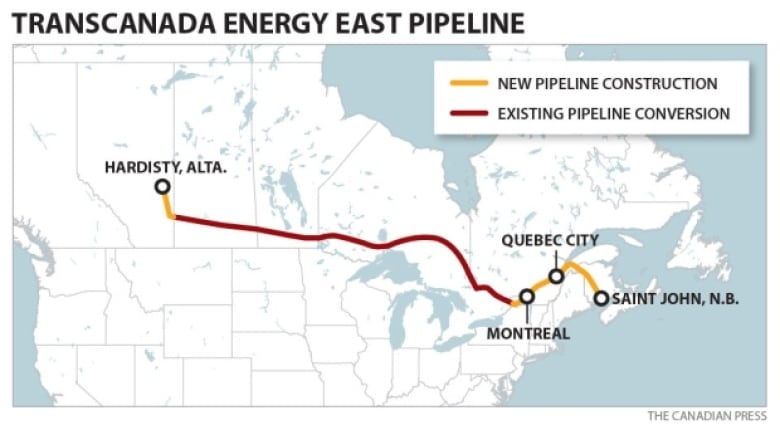Energy East opposition from Montreal's mayor draws criticism in Alberta
Alberta leaders call it 'ungenerous and short-sighted,' take jabs at Montreal's own actions
Political and business leaders in Alberta and across the Prairiesare voicing strong reaction to Montreal MayorDenis Coderre's opposition of the Energy East pipeline project.
Coderresaid in announcement onThursday thatpotential environmental risksoutweighpossible economic benefits for theMontreal area.
Calgary Mayor Naheed Nenshi didn't waiver when asked what he thought ofhis Montreal counterpart's claims.
"He's wrong, it'sas simple as that," Nenshi said Thursday afternoon.
WildroseParty Leader Brian Jean took a jab at Montrealon Twitter, slamming the St. Lawrence sewage dump.
You cant dump raw sewage, accept foreign tankers, benefit from equalization and then reject our pipelines https://t.co/J94PksWtJt #ableg
—@BrianJeanWRP"While Mr. Coderre dumps a billion litres of raw sewage directly into his waterways and benefits from billions in equalization payments, his opposition to the Energy East pipeline is nothing short of hypocritical," saidJean in a media release.
"Montreal buys millions of barrels of foreign oil from dictatorships, but it is rejecting oil from their friends in confederation it's disgraceful.This is a project that will benefit all of Canada, and will improve our GDP by $55 billion."
The City of Montreal's opposition isthe latest challenge toTransCanada's proposed pipeline project, which would carry 1.1 million barrels a day ofoilsandscrude through Quebecto anexport terminal in Saint John, N.B.
The project would include the existing TransCanada pipeline as far east as Montreal plus a new pipeline through Quebec.
Saskatchewan premier weighs in
Calling it a sad day for the country, Saskatchewan Premier Brad Wallwrote a Facebookpost blasting"leaders from a province that benefits from being part of Canada" for being"parochial about a project that would benefit all of Canada."
I trust Montreal area mayors will politely return their share of $10B in equalization supported by west #EnergyEast https://t.co/DUtlu4VjPx
—@PremierBradWallHis social media posts alsocriticizeQuebec leaders for accepting nearly$10 billion in equalization payments this year, saying the western energy sector has supported the entireCanadian economy for the better part of the last decade.
"Is it too much to expect that these Quebec municipal leaders would respond to this reality with generous support for a pipeline that supports the very sector that has supported them?" said Wall.
Safest way to transport, says spokesperson
"We know that people do have questions and concerns related to pipeline safetyrelated to the protection of the environmentand we want to address those concerns as best we can," saidTimDuboyce, spokesperson for Energy East.
"At the end of the day we are looking at a project that is better than the status quo.Pipelines are proven to be the safest way to move oil over long distancesoil that we all need."
Since the pipeline was first proposed in 2013,Duboycesays there have been roughly700 changes made to the project in response tofeedback from stakeholders.
He saysTransCanadawill reviewthe report based on the public consultation from around the Montreal area, and will consider changesto the route and hostingadditional information meetings.
DeronBilous,Alberta'sminister of economic development and trade, callsCorderre's statement "both ungenerous and short-sighted."
"We are also facing a very serious challenge today due to the collapse in commodity prices and so do all Canadians, since we all look to the same resource revenues to create jobs and fund the social programs we all depend on."
Cross-Canada impact
"It's not progress," saidChris Bloomer,president and CEO of the Canadian Energy Pipeline Association."In today's environment we need to be cognizant that projects can't wait forever."
Bloomer says a thoroughapplication process is necessary but comments calling for barriers to pipeline projects delay potential economic benefits.
"We need to communicate what the industry is doing to demonstrate that they are [safe]," said Bloomer.
Greg Stringham, vice president of Canadian Association of Petroleum Producers, says this isn't a setback, but wants to see Quebec and Atlantic Canada reverse their dependance on foreign oil.
He says 600,000 barrels of oil are brought in from suppliers outsideof Canada every day.
"The real prime purpose for us it to make this Canadian oil available for others in other parts of Canada including Quebec."
Greenpeacealsorespondedto Thursday'sannouncementbycalling on Prime Minister Justin Trudeau to reject the pipeline project.
"Trudeau already said that pipelines projects must be accepted by the local communities before they get approved. [Montreal's] decision is a clear no to TransCanada's project, which means that it cannot go forward," said Patrick Bonin, a Greenpeace climate and energy campaigner.
The National Energy Board has yet to have its review of the project. TransCanada will submit a report to the federal government in 2017. If approved, they hope the pipeline will be operational by 2020.














_(720p).jpg)


 OFFICIAL HD MUSIC VIDEO.jpg)
.jpg)



























































































